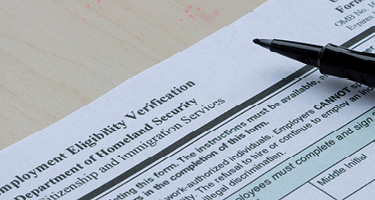PENNSYLVANIA WORKERS’ COMPENSATION
Workers’ compensation is insurance paid by the employer that provides cash and or medical benefits to an employee who is injured on the job. Most every Pennsylvania worker is covered by the Workers’ Compensation Act. Regardless of the size or type of the company you work for, businesses must provide compensation coverage for their employees. If your employer does not have compensation insurance, you may be entitled to benefits under the Uninsured Employer Guaranty Fund.
NO-SUE RULE
In most cases, you cannot sue your employer. Workers’ compensation insurance provides just that: compensation for your illness or injury. It is a no-fault system that protects employees from on-the-job accidents or illnesses regardless of who is at fault.
There are some exceptions to the no-sue rule. If OSHA believes that your employer violated federal safety rules and that violation caused your injury, you may be able to receive workers’ compensation and pursue an additional claim. If your employer caused you intentional harm by committing a specific act with the intention of bringing you harm, you can file a lawsuit. Or, if your employer fails to comply with the Workers’ Compensation Act by not providing insurance, your employer is not protected by the immunity that the Workers’ Compensation Act provides.
REPORTING A WORK INJURY OR ILLNESS
In Pennsylvania, you are required to report your injury or illness to your employer within 21 days of your diagnosis or injury. If the work-related injury or disease is not reported in the first 120 days, with the exception of progressive diseases, no compensation is allowed. Regardless of the severity, all work-related injuries should be reported immediately. By not doing so, you could be jeopardizing your workers’ compensation benefits. Your employer is required to file a first report of your injury to the Bureau of Workers’ Compensation once you have lost a day or a shift of work.
If the injury or illness is deemed to be work-related by either the employer or the employer’s insurance carrier, the insurance carrier is required by law to pay. If the employer or employer’s insurance carrier denies the claim, no compensation will be paid until a workers’ compensation judge determines if the claimant is entitled to benefits.
TYPES OF BENEFITS
There are several types of workers’ compensation benefits to which you may be entitled. Medical care covers payment for surgical and medical treatment that is required because of your work-related illness or injury. Lost wage benefits are available if you are unable to work or unable to perform your pre-injury job. Specific lost benefits apply if you have lost a body part or sense or suffered a disfigurement on your head, neck or face. Surviving dependents may be entitled to death benefits if the injury results in death.
CAUSES OF WORK INJURIES
It is the right of all employees to feel safe and be provided with a hazard-free workplace. Unfortunately, this is not always the case. Common causes of work injuries include but are not limited to:
- Motor vehicle accidents
- Lack of supervision
- Faulty wiring and electrical dangers
- Heavy, unsecured objects falling
- Lack of proper training
- Defective equipment or machinery
- Lack of safety equipment
- Toxic exposures
- Spills
- Fires and explosions
- Lifting heavy objects
COMMON WORK INJURIES
According to the CDC, National Institute for Occupational Safety and Health (NIOSH):
- 18% of the 1,176,340 nonfatal work injuries resulting in days away from work in 2020 were related to slips, trips and falls.
- 196,140 injuries due to contact with objects and equipment in 2020 were so severe that they resulted in time away from work.
- In 2020, 1,038 U.S. workers died in work-related crashes involving motor vehicles (22% of all deaths).
- Male workers accounted for approximately 66% of the work-related injuries treated in emergency departments.
WHEN TO HIRE A LAWYER
If you suffered a minor injury that requires minimal medical treatment or little or no time off from work, you may be able to get by without an attorney representing you. If, however, the situation at any time is causing you stress or causing you the inability to work, the inability to perform your pre-injury job or the inability to obtain medical treatment, it’s time to hire an experienced workers’ compensation lawyer.
In our practice, we often hear clients say that their employer does not want to pay the claim or that they were promised compensation but have not received any. In that situation, it is time to hire an attorney. If the employer’s settlement offer does not cover all expenses or costs incurred as a result of a work-related injury or illness, it is time to hire an attorney. If you feel that the boss is retaliating against you for filing a just workers’ compensation claim, it is time to hire an attorney.
These are just a few examples of when hiring an attorney will benefit you. The insurance companies have legal representation; why shouldn’t you have someone intervene on your behalf? Consultations are free, and workers’ compensation attorneys are hired on a contingency basis. There is no cost to you unless compensation is received.
Workers’ compensation claims can be much more complicated than outlined above. For further information, please visit www.dli.pa.gov or visit our website, www.lowenthalabrams.com.
James B. Mogul is a Certified Pennsylvania Workers’ Compensation Attorney Specialist. He has been practicing Pennsylvania workers’ compensation law for 39 years and has received substantial compensation benefits for his clients.































